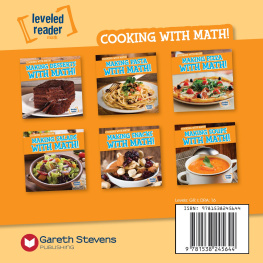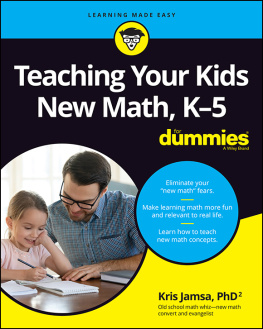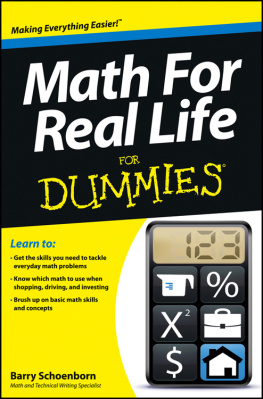Frenkel - Love and Math
Here you can read online Frenkel - Love and Math full text of the book (entire story) in english for free. Download pdf and epub, get meaning, cover and reviews about this ebook. publisher: Basic Books, genre: Religion. Description of the work, (preface) as well as reviews are available. Best literature library LitArk.com created for fans of good reading and offers a wide selection of genres:
Romance novel
Science fiction
Adventure
Detective
Science
History
Home and family
Prose
Art
Politics
Computer
Non-fiction
Religion
Business
Children
Humor
Choose a favorite category and find really read worthwhile books. Enjoy immersion in the world of imagination, feel the emotions of the characters or learn something new for yourself, make an fascinating discovery.

Love and Math: summary, description and annotation
We offer to read an annotation, description, summary or preface (depends on what the author of the book "Love and Math" wrote himself). If you haven't found the necessary information about the book — write in the comments, we will try to find it.
Love and Math — read online for free the complete book (whole text) full work
Below is the text of the book, divided by pages. System saving the place of the last page read, allows you to conveniently read the book "Love and Math" online for free, without having to search again every time where you left off. Put a bookmark, and you can go to the page where you finished reading at any time.
Font size:
Interval:
Bookmark:
The Heart of Hidden Reality
Edward Frenkel
BASIC BOOKS
A Member of the Perseus Books Group
New York
Copyright 2013 by Edward Frenkel
Published by Basic Books, A Member of the Perseus Books Group
All rights reserved. No part of this book may be reproduced in any manner whatsoever without written permission except in the case of brief quotations embodied in critical articles and reviews. For information, address Basic Books, 250 West 57th Street, 15th Floor, New York, NY 10107-1307.
Books published by Basic Books are available at special discounts for bulk purchases in the United States by corporations, institutions, and other organizations. For more information, please contact the Special Markets Department at the Perseus Books Group, 2300 Chestnut Street, Suite 200, Philadelphia, PA 19103, or call (800) 810-4145, ext. 5000, or e-mail .
Library of Congress Cataloging-in-Publication Data
Frenkel, Edward, 1968 author.
Love and math : the heart of hidden reality / Edward Frenkel.
pages cm
Includes bibliographical references and index.
ISBN 978-0-465-06995-8 (e-book) 1. Frenkel, Edward, 1968 2. MathematiciansUnited StatesBiography. 3. MathematicsMiscellanea. I. Title.
QA29.F725F74 2013
510.92dc23
[B]
2013017372
10 9 8 7 6 5 4 3 2 1
For my parents
Contents
Theres a secret world out there. A hidden parallel universe of beauty and elegance, intricately intertwined with ours. Its the world of mathematics. And its invisible to most of us. This book is an invitation to discover this world.
Consider this paradox: On the one hand, mathematics is woven in the very fabric of our daily lives. Every time we make an online purchase, send a text message, do a search on the Internet, or use a GPS device, mathematical formulas and algorithms are at play. On the other hand, most people are daunted by math. It has become, in the words of poet Hans Magnus Enzensberger, a blind spot in our culture alien territory, in which only the elite, the initiated few have managed to entrench themselves. Its rare, he says, that we encounter a person who asserts vehemently that the mere thought of reading a novel, or looking at a picture, or seeing a movie causes him insufferable torment, but sensible, educated people often say with a remarkable blend of defiance and pride that math is pure torture or a nightmare that turns them off.
How is this anomaly possible? I see two main reasons. First, mathematics is more abstract than other subjects, hence not as accessible. Second, what we study in school is only a tiny part of math, much of it established more than a millennium ago. Mathematics has advanced tremendously since then, but the treasures of modern math have been kept hidden from most of us.
What if at school you had to take an art class in which you were only taught how to paint a fence? What if you were never shown the paintings of Leonardo da Vinci and Picasso? Would that make you appreciate art? Would you want to learn more about it? I doubt it. You would probably say something like this: Learning art at school was a waste of my time. If I ever need to have my fence painted, Ill just hire people to do this for me. Of course, this sounds ridiculous, but this is how math is taught, and so in the eyes of most of us it becomes the equivalent of watching paint dry. While the paintings of the great masters are readily available, the math of the great masters is locked away.
However, its not just the aesthetic beauty of math thats captivating. As Galileo famously said, The laws of Nature are written in the language of mathematics. Math is a way to describe reality and figure out how the world works, a universal language that has become the gold standard of truth. In our world, increasingly driven by science and technology, mathematics is becoming, ever more, the source of power, wealth, and progress. Hence those who are fluent in this new language will be on the cutting edge of progress.
One of the common misconceptions about mathematics is that it can only be used as a toolkit: a biologist, say, would do some field work, collect data, and then try to build a mathematical model fitting these data (perhaps, with some help from a mathematician). While this is an important mode of operation, math offers us a lot more: it enables us to make groundbreaking, paradigm-shifting leaps that we couldnt make otherwise. For example, Albert Einstein was not trying to fit any data into equations when he understood that gravity causes our space to curve. In fact, there was no such data. No one could even imagine at the time that our space is curved; everyone knew that our world was flat! But Einstein understood that this was the only way to generalize his special relativity theory to non-inertial systems, coupled with his insight that gravity and acceleration have the same effect. This was a high-level intellectual exercise within the realm of math, one in which Einstein relied on the work of a mathematician, Bernhard Riemann, completed fifty years earlier. The human brain is wired in such a way that we simply cannot imagine curved spaces of dimension greater than two; we can only access them through mathematics. And guess what, Einstein was right our universe is curved, and furthermore, its expanding. Thats the power of mathematics I am talking about!
Many examples like this may be found, and not only in physics, but in other areas of science (we will discuss some of them below). History shows that science and technology are transformed by mathematical ideas at an accelerated pace; even mathematical theories that are initially viewed as abstract and esoteric later become indispensable for applications. Charles Darwin, whose work at first did not rely on math, later wrote in his autobiography: I have deeply regretted that I did not proceed far enough at least to understand something of the great leading principles of mathematics, for men thus endowed seem to have an extra sense. I take it as prescient advice to the next generations to capitalize on mathematics immense potential.
When I was growing up, I wasnt aware of the hidden world of mathematics. Like most people, I thought math was a stale, boring subject. But I was lucky: in my last year of high school I met a professional mathematician who opened the magical world of math to me. I learned that mathematics is full of infinite possibilities as well as elegance and beauty, just like poetry, art, and music. I fell in love with math.
Dear reader, with this book I want to do for you what my teachers and mentors did for me: unlock the power and beauty of mathematics, and enable you to enter this magical world the way I did, even if you are the sort of person who has never used the words math and love in the same sentence. Mathematics will get under your skin just like it did under mine, and your worldview will never be the same.

Mathematical knowledge is unlike any other knowledge. While our perception of the physical world can always be distorted, our perception of mathematical truths cant be. They are objective, persistent, necessary truths. A mathematical formula or theorem means the same thing to anyone anywhere no matter what gender, religion, or skin color; it will mean the same thing to anyone a thousand years from now. And whats also amazing is that we own all of them. No one can patent a mathematical formula, its ours to share. There is nothing in this world that is so deep and exquisite and yet so readily available to all. That such a reservoir of knowledge really exists is nearly unbelievable. Its too precious to be given away to the initiated few. It belongs to all of us.
Font size:
Interval:
Bookmark:
Similar books «Love and Math»
Look at similar books to Love and Math. We have selected literature similar in name and meaning in the hope of providing readers with more options to find new, interesting, not yet read works.
Discussion, reviews of the book Love and Math and just readers' own opinions. Leave your comments, write what you think about the work, its meaning or the main characters. Specify what exactly you liked and what you didn't like, and why you think so.




